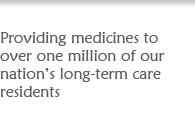|
FOR IMMEDIATE RELEASE
September 26, 2002
|
Contact: Elizabeth Eddlemon
Antoinette Forbes
(202) 955-6200
|
|
|
MassHealth Reimbursement Plan Means Losses for Nursing Home Pharmacies
Patient Care Will Suffer If Rate Cut Approved
BOSTON, MA - The Long Term Care Pharmacy Alliance (LTCPA) today submitted an updated report to the Massachusetts Division of Health Care Finance and Policy (DHCFP) indicating that the proposed cut to MassHealth reimbursement rates will cause nursing home pharmacies to lose money nearly every time they dispense one of their most frequently ordered medications. The companies have previously testified that the rate cut could severely impact the ability of nursing home pharmacies to provide essential services to Massachusetts' elderly and frail population.
"The numbers show that the major nursing home pharmacies will lose over two-hundred thousand dollars every month if the planned rate cut goes through, and that's just on their 25 most frequently dispensed drugs," said Stephen J. Northrup, executive director of the Long Term Care Pharmacy Alliance (LTCPA), which represents the major national nursing-home pharmacy operators. "If the proposed 12-percentage-point rate cut is enacted, our pharmacies will be hard-pressed to afford helping Massachusetts serve the needs of its most vulnerable citizens."
The LTCPA submitted drug acquisition-cost data for 25 of the most common nursing home medications and applied the proposed reimbursement rate of wholesale acquisition cost (WAC) minus 2 percent, plus a $3.00 "dispensing fee." The average gross profit (i.e., reimbursement minus net cost of the drug) of $7.04 under the new rate falls well short of the $11.37 nursing home pharmacies incur, on average, in dispensing a drug. As a result, the LTCPA projected an average monthly loss of $214,395, or $4.33 per prescription, if the proposed rate cut goes through.
As a result, patients who rely on the specialized services that nursing home pharmacies provide would be in particular jeopardy. A study conducted by the accounting firm of BDO Seidman, LLP found that it costs the major national operators of nursing-home pharmacies, on average, approximately $11.37 to dispense a prescription. The dispensing costs for nursing-home pharmacies are directly related to the intensive service needed to care for this medically complex and vulnerable patient population, such as:
* Specialized error-reducing packaging
* Round-the-clock delivery
* Intravenous medications
* Frequent clinical evaluation by consultant pharmacists who focus on geriatric pharmacy care
These services are not typically required for customers of retail pharmacies, whose costs of dispensing a drug are $7.05, on average, based on 2000 data from the National Association of Chain Drug Stores.
Earlier this month, the DHCFP asked for acquisition-cost information on a list of 25 drugs. LTCPA believed that this list was not a representative sample of drugs dispensed to MassHealth beneficiaries in the state, as it included several drugs that are rarely dispensed to residents of nursing homes. Instead, LTCPA-member pharmacies compiled a list of the top 25 drugs by number of prescriptions dispensed to MassHealth beneficiaries from May through July 2002. Based on these lists, LTCPA developed a weighted average of their gross profit per MassHealth prescription claim, assuming the pending 12-percentage-point reimbursement reduction.
Today in Massachusetts, 90 percent of prescriptions written for institutionalized patients are filled by the major national long-term care pharmacies. Long-term care pharmacies are heavily dependent on Medicaid revenues. Seventy percent of residents in Massachusetts nursing facilities are Medicaid beneficiaries, and nursing-home pharmacies don't have retail storefronts or other operations that would help them offset a drastic MassHealth rate cut. Long-term care providers - including nursing home pharmacies - rely on adequate Medicaid payments to sustain the specialized services they provide.
"We believe that we have demonstrated time and again that the vital services provided by nursing home pharmacies to MassHealth beneficiaries should be exempted from the proposed reimbursement rate cuts," said Northrup. "We simply can't afford any further cuts - and neither can the thousands of elderly, frail and disabled Massachusetts residents who depend on us."
"My members want to continue serving nursing-home residents in Massachusetts, but I cannot guarantee that they will be able to do so if this rate cut goes through," said Northrup.
# # #
Copies of this "real world" data - which was provided to DHCFP - are available to interested media.
|


